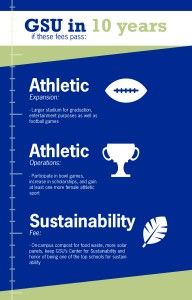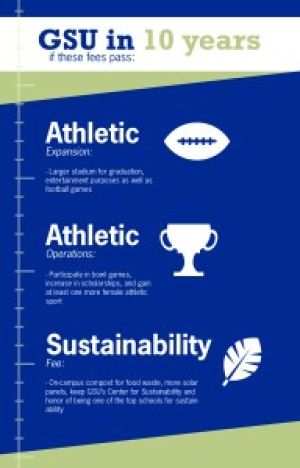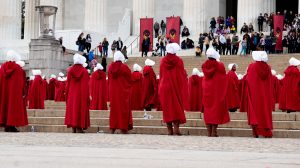Students to vote on new fees
September 24, 2012
The polls open today for students to vote on fees that will expand stadium seating, financially support moving to Football Bowl Subdivision and prevent Georgia Southern University’s sustainability program from being discontinued.
The three fees are the sustainability fee, the athletic operations fee and the athletic expansion fee. They will add $10, $75 and $25 to GSU’s tuition, respectively.
“The administration has done a good job of publicizing the fees, but not a good job of informing the students as to what they’re going toward,” Chad Hamilton, junior political science major, said.
The sustainability fee, also known as the “green fee,” will go toward maintaining the university’s reputation of being environmentally friendly, Hamilton said.
The Allen E. Paulson Foundation in the College of Science and Technology once funded The sustainability at GSU, but now those funds have been redirected to support the Engineering program leaving no financial backing for the Center for Sustainability, Dr. Lissa Leege, director of the Center for Sustainability at GSU, said.
“I have talked to Dr. Leege last week and I think students don’t realize that if the fee does not pass, our Center for Sustainability will go out of business because its funding, what funding it had, went to the College of Engineering when those two colleges were divided,” Dr. David Dudley, head of the Department of Literature and Philosophy, said.
“To me, this is the most important of the three and the one I earnestly hope will pass,” Dudley said.
For the past two years, GSU has been named one of the top eco-friendly campuses in the U.S. by the Princeton Review. This is in large part due to the efforts of the Center for Sustainability at Georgia Southern and a host of volunteers who have dedicated their time to increase sustainability, Leege said.
“The fund was started in 2007 by Green Earth and SGA. A survey was done, like the one we did, and the majority of students voted for it,” Christina Belge, senior public relations major and executive vice president of the Student Government Association, said. “It didn’t go any further because the administration of the time didn’t approve of it.”
“In the survey we conducted, 81 percent of students approved of it,” Belge said.
“This is the only fee brought to the administration by the students. It’s not a top-down thing; it’s bottom-up,” Belge said.
“The fee is divided into four sections, aside from supporting the Center for Sustainability,” Belge said.
The sections are the sustainable projects, which are physical aspects like waterless urinals and solar panels, promotional efforts is signage, such as signs that remind people to turn off the lights or faucets, sustainability curriculum, which would go toward expanding the curriculum and making it more competitive, and the revolving fund, which takes all the money saved by cutting out paper, using solar panels, etc. and put it toward pre-existing scholarships.
Sustainability includes much more than recycling.
“Many students don’t realize that sustainability on this campus is a lot more than dropping an aluminum can in a recycling bin. That is a very small part of it,” Dudley said.
“Students don’t realize now that food waste from our various restaurants have to be trucked to Jessup, Georgia 70 miles away for disposal in a landfill,” Dudley said. “Not only is there organic material that is just being lost, there are the costs of all of that transportation, gasoline, and every time there is a vehicle in the road, that adds more pollutants.”
“One of the things Dr. Leege would like to see us buy is a composter that could turn food waste into usable organic material for the flower beds and plantings on this beautiful campus,” Dudley said.
“I have never thought about this, but I think it’s a marvelous idea, is that there is student interest in creating vegetable gardens on the Georgia Southern campus,” Dudley said. “Gardens for student use or maybe even use for our own food service places, that is a terrific sustainability idea.”
The FBS fee would move GSU’s football team from a Football Championship Subdivision team to a Football Bowl Subdivision team.
Representatives of the GSU athletic department could not be reached for comment.
“Teams that have made this jump haven’t been very successful, like Troy, or Middle Mississippi,” Hamilton said.
“You can look at the records of other teams who made the move from FCS to the FBS and, at least for the first years or so, their records are worse than they were,” Dudley said.
“With the move to FBS there will be an increase in administrative expenses and travel costs,” Hamilton said. “Revenues almost never cover the increased expenses.”
“All the studies indicate very few football programs are moneymakers, let alone self-sustaining, and they rely upon student activity fees as well as a large ticket sale,” Dudley said.
The study was done by the university and was published into an article in June 2009 by an external consulting company. The study states that while GSU could benefit from this step up in terms of athletics and building a competitive team, it is the financial aspect that seems “risky.” Dudley said.
“We should stay at out current level. We’ll remain on top, it is cheaper, and it makes for better football,” Hamilton said.
“It is the feeling among some of the faculty here that president Keel just wants to add this change to his resume,” Hamilton said.
“I think this is where there are a great many unknowns. A 75 dollar fee that, from my understanding, will only go into effect in what ever semester that Georgia Southern would actually receive an invitation to a conference like the Sunbelt or Conference USA,” Dudley said.
“I think that President Keel and the administration believe the larger stadium and the FBS will attract more students to Georgia Southern. That may or may not be the case,” Dudley said.
“President Keel has stated from the beginning that his goal is for Georgia Southern to be a university of 25,000. Enrollment has been pretty flat for the last couple of years, and that is due to a large number of different factors that are no body’s fault,” Dudley said. “An extra 5,000 students would mean more money for the athletic programs because every new student would pay that $75 fee.”
The Eagles are doing well, but not well enough to move up to FBS, Dudley said.
“The history of Georgia Southern football since the Erk Russell years is one of dominating the SoCon. We don’t dominate the SoCon anymore,” Dudley said. “Coach Monken had an excellent season last season, and we did very well, but it has been some years since the Erk Russell glory years where it was competitive and championship year after year.”
“Southern boosters are used to a winning team. Every year it’s ‘one more time, one more time, one more time’ and there are coaches between Coach Monken and Erk Russell who didn’t last very long because they could not put together a winning season,” Dudley said. “Is the university and its boosters and its students ready for some seasons of middle of the line play or even losing play? Because if you look at the funding of our athletic programs even in the SoCon compared to the Sunbelt or Conference USA, our spending on athletics would still be low or the lower tier.”
The quality of a sports team shouldn’t determine the quality of educations, Dudley said.
“Things that I have heard students saying are things such as this: if you play in the FBS, you get the chance of being on T.V., your Georgia Southern degree would be worth more. That’s an argument that I’ve failed to see.” Dudley said. “Your Georgia Southern degree, I hope, is worth something because of academics, not because of sports. Sports is icing on the cake.”
“Georgia Southern has national exposure and a reputation for its football program as it is. We have a legendary coach and a legendary team on the level of which we already have played. What’s wrong with being great at the level at which you are?” Dudley said.
The stadium expansion fee will fund the construction of 4,000 additional seats to the current 18,000 seats available, bringing the total amount of seating to 22,000 including an upper deck.
“That one I actually have no problem with. The stadium was designed to eventually be expanded,” Dudley said. “There are people who say we need more seating in the stadium, even now on home game days, for students.”
“I have heard it said that if this 25-dollar fee passes, then expansion on the stadium could begin in January,” Dudley said.
Dudley said, “If that fee passes, Georgia Southern will be possessed of an expanded, re-furbished, up-to-date stadium. It can be used for not only football games, but for other purposes.”
Lindsay Gaskins contributed to this report.







